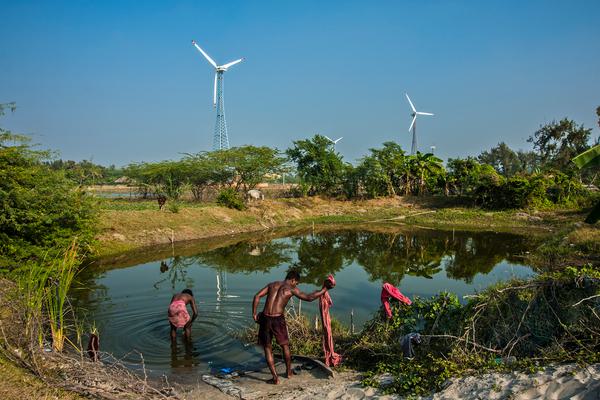Businesses need more guidance on how to advance 'just' transitions - South Africa offers significant lessons
30 October 2024

Three years ago, South Africa became the first country to negotiate with donor nations a Just Energy Transition Partnership (JETP) agreement, securing an initial $8.5 billion made up of primarily loans and other concessional finance to catalyse its decarbonisation while delivering environmental, economic, and societal transformation. South African government has since endorsed a comprehensive policy architecture that shapes how this will happen - a national Just Transition Framework and initial five-year Investment Plan and Implementation Plan for 2023-2027.
With the transition now moving from design to implementation, this is a critical moment to shine a spotlight on the role of business in the delivery of South Africa’s energy transition commitments.
Because crucially, the South African ambition is not merely energy replacement - it is committed to achieving a “just” energy transition that addresses the historic injustices of apartheid, navigates economic reform to tackle present day inequalities, and transforms a maligned energy system.
It is in this context that all companies involved - public and private, domestic and international, across sectors - have responsibilities to reflect on their roles in advancing the three forms of justice central to South Africa’s transition plans: procedural justice (how those affected are involved in decision making), distributive justice (how the benefits and burdens of transition are shared equitably), and restorative justice (where historic wrongs are redressed to heal people and the land).
The responsible business landscape in South Africa
South Africa’s history informs its present day in myriad ways - including around the role of the private sector. From the memory of companies that thrived under the apartheid government’s discriminatory policies, to the way the private sector bridges service gaps left by the state’s constraints today - but at a cost unachievable for many - South Africa’s private sector occupies a complex position in the country’s collective imagination.
This is also evident in South Africa’s deep-rooted energy challenges, symbolised by the financial instability, ageing infrastructure, frequent labour disputes, and ongoing corruption crisis facing Eskom, South Africa’s state-owned utility company.
Businesses involved in making energy transitions effective and fair have work to do rebuilding their social contract with South Africans - but they are not starting from zero.
Responsible business practices are anchored in South Africa’s progressive Constitution and Bill of Rights, including the right to a healthy environment, which in horizontally enforceable to non-state actors such as business enterprises. The state of ESG disclosure is amongst the highest of all emerging and developing economies, though these requirements and assessments still largely consider risks to the business, not on risks that business activities pose to people.
The UN Guiding Principles on Business and Human Rights are an invaluable tool in addressing this reality and in operationalising just transitions approaches and actions by business moving forward. They help companies ensure that adverse impacts on people - both actual and potential - are prevented and mitigated. As IHRB’s new report points out, the UNGPs and other international responsible business standards are crucial for South Africa in advancing the socioeconomic ambitions at the centre of the energy transition - and to more strategically guide their positive impacts, value addition, and benefit creation for all.
Despite South Africa’s strong and detailed commitments, the Just Transition Framework, Investment Plan and Implementation Plan currently lack sufficient clarity and guidance for businesses about how to use these international frameworks to tangibly advance justice as the country moves away from fossil fuels.
This is not unique to South Africa - many transition processes do not yet embed existing responsible business principles or the UNGPs. But there is a huge opportunity to arm domestic and international companies in South Africa with the guidance and tools they need, without having to reinvent the wheel.
Four essential elements for advancing the “J” in just energy transitions by business
IHRB’s new report offers critical guidance for policymakers and company practitioners on how to begin operationalising responsible business practices in South Africa’s energy transition. Specifically, we hone in on four essential elements:
- Risks & Impacts: While ESG is well engrained in South African corporate practice, there is a need to deepen understandings of business strategy to ensure just transition risk assessments are guided by impact, not influence. Businesses have a corporate responsibility to respect human rights, meaning proactively preventing harm to workers and communities by conducting people-centric just transition risk management processes, and remedying adverse impacts that will occur.
- Benefits & Opportunities: Similarly, our report finds that while South African businesses have a strong track-record of investing in social causes, more guidance is needed on how to deepen these approaches and strategically align them with the JET’s strategic priorities to ensure genuine value addition. By building on a foundation of rights-respecting responsible business practices, companies will be much more enabled to do this, and to avoid perceptions of transition ‘offsetting’ whereby benefits in one aspect of the transition are seen to outweigh or offset harms done elsewhere.
- Agency & Accountability: Thirdly, procedural justice is the cornerstone of South Africa’s just energy transition. Businesses have vital roles to play in this regard by improving the quality of engagement with affected stakeholders, and rethinking traditional approaches to better embed their agency and true co-creation in transition planning and decision making, including by maintaining accountability over the long term as the transition unfolds inthe next two to three decades.
- Transformational Systems Change: And finally, South Africa’s detailed just energy transition framework and plans offer significant lessons for the rest of the world about how to restructure historic systems that have created the dual climate and inequality crises. This transformational change can only happen if businesses take proactive steps to reflect on their roles in systemic injustices, how their business models may contribute, and what ‘just’ business really means.
We know that ‘justice’ is not a common language in most corporate cultures. This is why it is critical that businesses are provided with greater guidance and clarity about their ‘just’ responsibilities as energy transitions continue in all regions. If successful, the outcomes could be hugely impactful not only for South Africa - but for all efforts aimed at shaping a more sustainable future.
Cover image credit: Gulshan Khan / Climate Visuals [Mine in South Africa]





